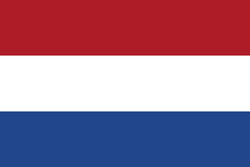The Netherlands is a small, densely populated minor European power. Situated in Northern Europe it is the heart of the remnants of the old Dutch colonial Empire and the homeland of the Dutch people.
History[]
The Great War[]
The Great War devastated Europe, though by being politically neutral the Netherlands was able to avoid the upfront costs of the war. Though while the nation avoided the immediate costs of war, the lingering effects of the conflict paid heavily on the small Dutch nation.
At the start of the war, they made it clear that the country wanted to be remain neutral. The surrounding countries respected that wish; but as the war got worse, rumors began to surface that the United Kingdom planned an invasion of the country. To ensure that Britain nor any other country does not invade, the Netherlands mobilized their army as two hundred thousand men marched to fortresses like the Waterline and the Defense Line of Amsterdam. The navy began patrols in the waters of the Dutch East Indies
The German Empire invaded Luxembourg and Belgium as a means to access Northern France. The German military government of Belgium was established by the German Empire as about one million Belgians fled to the Netherlands. The government started on building small camps for refugees all over the Netherlands. Refuge relief was a major financial burden—costing 37 million Guilders.
Then, the English Channel, the North Sea, and the Atlantic Ocean was blockaded by the warring nations. As a trading nation, the Netherlands were hit the hardest by the blockades and trade restrictions. Rationing and Bread coupons were introduced after refugees came into the country from Belgium. The allied nations put heavy restrictions on the Netherlands, because they were still trading with the German Empire. They even tried to stop trading between the nations, but their attempts failed.
Their colonies (mainly the Dutch East Indies) were forced to close off trading with Europe and tried to trade in their own region instead. Shortages in the Netherlands rose as cotton, tobacco, tea and pepper were harder to get. Many colonists rose against the government as the war dragged on. The economy from both the colonies and the mainland suffered until the war ended.
When the war finally ended in 1925, many people didn't know what was going to happen to the world now. Britain hid from the world, Germany was fighting against their own revolution, France was in ruins, and the powerful Austrian-Hungarian Empire fell apart. Seeking to pull itself together, the Dutch renegotiated trading with the nations, in hopes of putting the broken pieces of Europe back together. However, the East Indies among with the rest of the Dutch colonies had revolted against their ruler; they were later conquered by the Japanese Empire.
Post War[]
While the country managed to avoid the immediate effects of the war, the damages all the same crippled the nation with the collapse of the global economy. The effects were felt as much as anywhere in the Netherlands with the failure of Dutch business and unemployment. Though while it was bad, it was all the same regionally better than the likes of its neighbors in Belgium and elsewhere, who in having suffered the direct brunt of the war and prolonged national occupation by German forces suffered a devastated economy. Economic refugees fought to seek shelter in the Netherlands through the late twenties and onward.
These economic conditions persist in Belgium as well as the Netherlands. Belgian migrants have re-settled on the Dutch side of the border instigating a demographic shift in the area.

